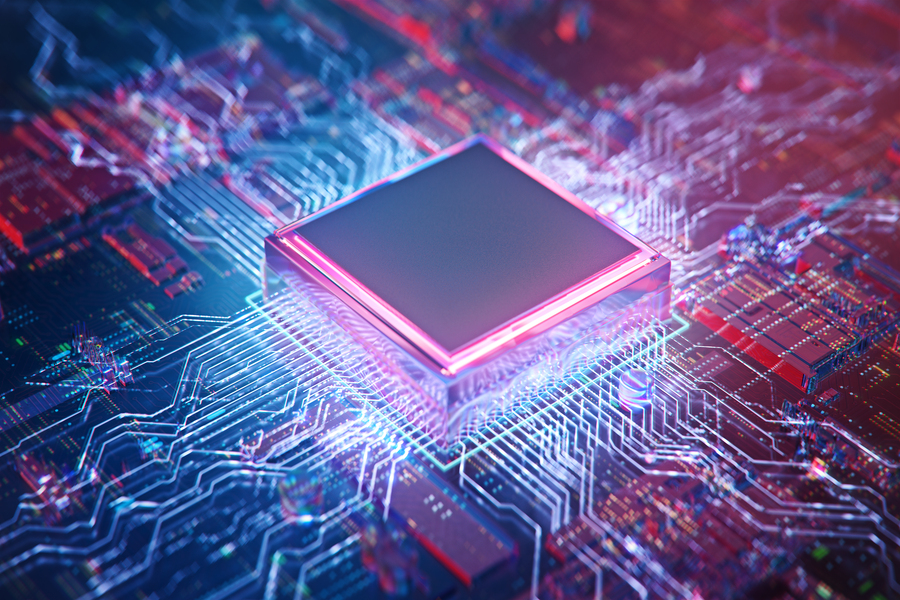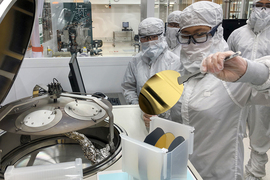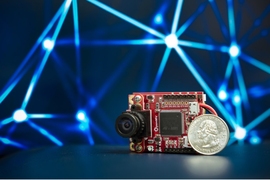The MIT AI Hardware Program is a new academia and industry collaboration aimed at defining and developing translational technologies in hardware and software for the AI and quantum age. A collaboration between the MIT School of Engineering and MIT Schwarzman College of Computing, involving the Microsystems Technologies Laboratories and programs and units in the college, the cross-disciplinary effort aims to innovate technologies that will deliver enhanced energy efficiency systems for cloud and edge computing.
“A sharp focus on AI hardware manufacturing, research, and design is critical to meet the demands of the world’s evolving devices, architectures, and systems,” says Anantha Chandrakasan, dean of the MIT School of Engineering and Vannevar Bush Professor of Electrical Engineering and Computer Science. “Knowledge-sharing between industry and academia is imperative to the future of high-performance computing.”
Based on use-inspired research involving materials, devices, circuits, algorithms, and software, the MIT AI Hardware Program convenes researchers from MIT and industry to facilitate the transition of fundamental knowledge to real-world technological solutions. The program spans materials and devices, as well as architecture and algorithms enabling energy-efficient and sustainable high-performance computing.
“As AI systems become more sophisticated, new solutions are sorely needed to enable more advanced applications and deliver greater performance,” says Daniel Huttenlocher, dean of the MIT Schwarzman College of Computing and Henry Ellis Warren Professor of Electrical Engineering and Computer Science. “Our aim is to devise real-world technological solutions and lead the development of technologies for AI in hardware and software.”
The inaugural members of the program are companies from a wide range of industries including chip-making, semiconductor manufacturing equipment, AI and computing services, and information systems R&D organizations. The companies represent a diverse ecosystem, both nationally and internationally, and will work with MIT faculty and students to help shape a vibrant future for our planet through cutting-edge AI hardware research.
The five inaugural members of the MIT AI Hardware Program are:
- Amazon, a global technology company whose hardware inventions include the Kindle, Amazon Echo, Fire TV, and Astro;
- Analog Devices, a global leader in the design and manufacturing of analog, mixed signal, and DSP integrated circuits;
- ASML, an innovation leader in the semiconductor industry, providing chipmakers with hardware, software, and services to mass produce patterns on silicon through lithography;
- NTT Research, a subsidiary of NTT that conducts fundamental research to upgrade reality in game-changing ways that improve lives and brighten our global future; and
- TSMC, the world’s leading dedicated semiconductor foundry.
The MIT AI Hardware Program will create a roadmap of transformative AI hardware technologies. Leveraging MIT.nano, the most advanced university nanofabrication facility anywhere, the program will foster a unique environment for AI hardware research.
“We are all in awe at the seemingly superhuman capabilities of today’s AI systems. But this comes at a rapidly increasing and unsustainable energy cost,” says Jesús del Alamo, the Donner Professor in MIT’s Department of Electrical Engineering and Computer Science. “Continued progress in AI will require new and vastly more energy-efficient systems. This, in turn, will demand innovations across the entire abstraction stack, from materials and devices to systems and software. The program is in a unique position to contribute to this quest.”
The program will prioritize the following topics:
- analog neural networks;
- new roadmap CMOS designs;
- heterogeneous integration for AI systems;
- onolithic-3D AI systems;
- analog nonvolatile memory devices;
- software-hardware co-design;
- intelligence at the edge;
- intelligent sensors;
- energy-efficient AI;
- intelligent internet of things (IIoT);
- neuromorphic computing;
- AI edge security;
- quantum AI;
- wireless technologies;
- hybrid-cloud computing; and
- high-performance computation.
“We live in an era where paradigm-shifting discoveries in hardware, systems communications, and computing have become mandatory to find sustainable solutions — solutions that we are proud to give to the world and generations to come,” says Aude Oliva, senior research scientist in the MIT Computer Science and Artificial Intelligence Laboratory (CSAIL) and director of strategic industry engagement in the MIT Schwarzman College of Computing.
The new program is co-led by Jesús del Alamo and Aude Oliva, and Anantha Chandrakasan serves as chair.









